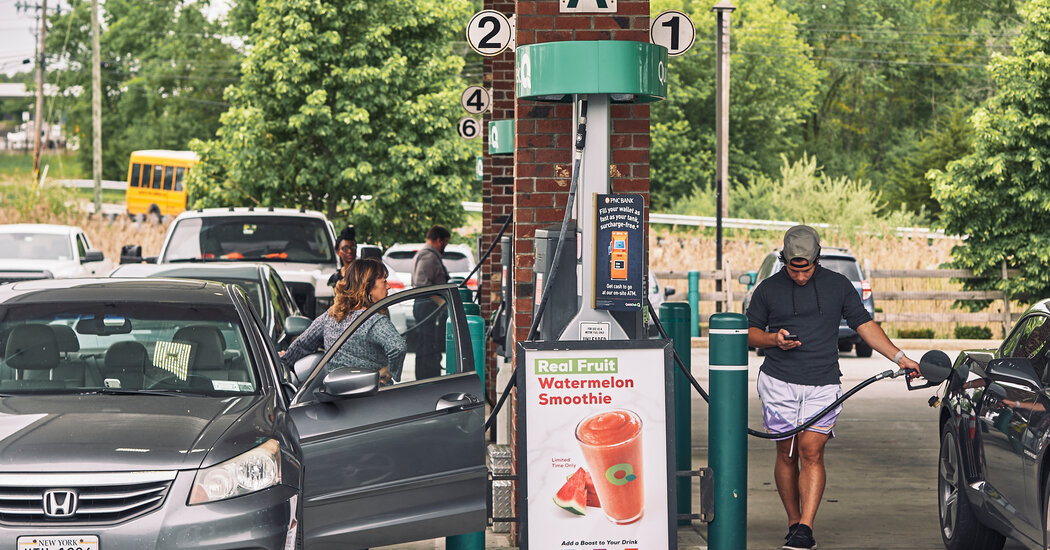HOUSTON — Gasoline prices hit a grim milestone on Saturday as the national average for regular gasoline reached $5 a gallon.
Summer gasoline is almost always more expensive as fuel demand rises around Memorial Day weekend. But this year, oil and refined fuel prices have soared to their highest level in 14 years, largely as a result of Russia’s invasion of Ukraine and ensuing sanctions, and an uptick in energy consumption as the economy recovers from the coronavirus pandemic.
The national average price of gasoline on Saturday was $5.00, 60 cents more than a month ago. A year ago, according to the AAA motorcycle club, gas sold for $3.08. The national average is at its highest point since March, when it broke the previous record set in July 2008, when oil traded at more than $133 a barrel. That was well over $10 above current levels without even taking inflation into account. At the time, the national average gasoline price was $4.11, or about $5.37 per gallon in today’s dollars.
The average price is over $4 a gallon in all states. In California, long one of the nation’s most expensive states for fuel, the price is over $6 a gallon. States with the largest recent increases in gasoline prices are Michigan, Delaware, Maryland, and Colorado.
Energy experts estimate that every cent of gasoline price increase costs Americans an additional $4 million a day.
Read more about oil and gas prices
“Get ready for a blistering summer ride,” said Tom Kloza, global head of energy analysis at Oil Price Information Service. “The average consumer is going to pay $450 a month for their fuel needs, which compares to just over $100 in 2020 during the pandemic.”
The war in Ukraine has had the most direct effect on gas prices, as sanctions against Russia have removed more than a million barrels of oil from world markets. Energy traders have also raised oil prices in anticipation of further declines in Russian production and exports.
But many other factors contributed to the price increase.
There is not enough capacity to refine oil into gasoline, diesel and jet fuel. Oil companies have closed a handful of refineries in recent years, especially during the pandemic when demand plummeted. A few new refineries will open or expand next year, which could help.
But for now, analysts say strong petrol demand is putting pressure on limited supplies and pushing prices up as motorists hit the road after several waves of new Covid-19 variants kept them close to home. The easing of China’s strict pandemic lockdowns has also pushed up oil prices.
High gas prices — along with rising costs for other necessities such as food and shelter — are a major problem for President Biden. Many political pundits believe Democrats could suffer losses in the November election as voters are angry and frustrated at high inflation. A report from Friday showed that consumer prices rose again in May, 8.6 percent higher than a year earlier, the fastest pace in more than 40 years.
Last week, as gas prices moved closer to the $5 threshold, officials in the Biden administration said the president would travel to Saudi Arabia, one of the world’s largest oil producers, in an apparent effort to restore diplomatic ties. and, crucially, to seek help in lowering energy prices. He also encourages domestic producers to pump up more oil, although major oil companies are reluctant to significantly increase their investments, preferring to return profits to investors through dividends and share buybacks.
In the past, when oil companies produced more oil in response to high prices, they created a surplus, undercutting their profits.
Mr. Biden has little influence over gas prices, which are determined by global supply and demand. Experts say that even Saudi Arabia is unable to cut prices quickly as it is unable to fully offset the expected drop in Russian production. The European Union agreed last month to ban most Russian oil by the end of the year.
In March, when Biden announced that the United States would ban Russian oil and natural gas, he warned Americans that “defending liberty will cost.” There are indications that high prices are starting to affect demand. Travel experts say some people choose to drive shorter distances while on vacation.
Ultimately, the high prices at the pump are likely to encourage motorists to switch to electric cars, but the purchase of such cars is expected to reduce demand in the coming years, not months.
“It takes time for price increases to affect demand,” said Donald Hertzmark, president of DMP Resources, a Washington-based energy consultancy. “Consumers must believe that the price increases are real and permanent, and there must be a period of adjustment to replace, sustain and destroy demand.”
Clifford Krauss reported from Houston and Marie Solis message from New York.

